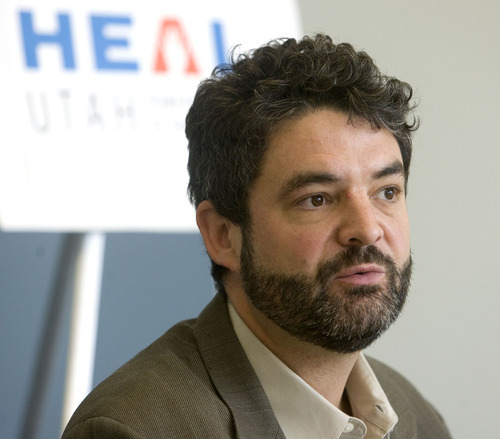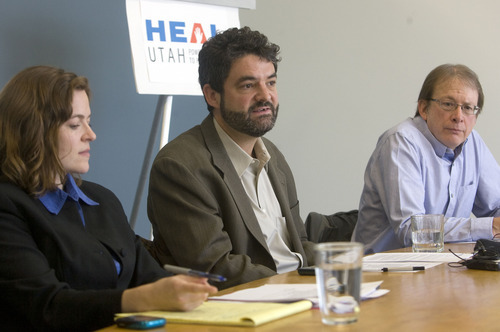This is an archived article that was published on sltrib.com in 2012, and information in the article may be outdated. It is provided only for personal research purposes and may not be reprinted.
Critics want State Engineer Kent Jones to reverse his decision to grant Green River water rights for Utah's first proposed nuclear power plant.
Led by environmental groups and joined by more than a dozen other opponents of the reactor plan, one request says Jones had too little solid information to make a proper decision, as the law requires. The petitioners also accuse Jones — the only state official with a formal say on the proposal — of ceding too much power to Washington, D.C., letting federal regulators determine if the 3,000-megawatt, $16-billion reactor project will protect Utah's environment, water users and public safety.
"At a minimum, the gaps in information submitted by the applicants warrant further investigation and withholding approval until further relevant details can be provided regarding the specifics or the plant — the available funding, the magnitude or the impact on river flows, resolution of (acknowledged) potential interference with other water right holders, and other unsettled issues," concludes a reconsideration request filed by the Healthy Environment Alliance of Utah (HEAL).
"The state engineer did not do the kind of in-depth analysis of the feasibility and economic viability that should be required to approve a large amount of water for such an expensive and risky project," said Sarah Fields, program director for Moab-based Uranium Watch, one of the three environmental groups associated withe a second reconsideration request.
All told, there were six environmental groups behind the requests, including the Sierra Club, Living Rivers, the Utah Rivers Council, the Center for Biological Diversity and the Center for River Advocacy. Castle Valley Mayor Dave Early, the Vetere melon-farming family in Green River, two river-running companies, a spa and 20 individuals signed onto the two requests, which also question whether downstream water users and endangered fish species are protected.
Both requests were filed on the last day for the state engineer to accept a kind of administrative appeal — the deadline was 5 p.m. Thursday. Jones repeatedly has said he expected to receive such a request even before his Jan. 20 decision.
"We'll give it due consideration," Jones said.
His approval, if it stands, would allow Blue Castle Holdings, a nuclear-development company created by former Utah legislator Aaron Tilton, to develop 53,600 acre-feet of water originally slated for coal-fired plants in San Juan and Kane counties. State Rep. Mike Noel, R-Kanab, is general manager of the Kane County Water Conservancy District.
Roughly enough water to serve the populations of Salt Lake City and Draper combined would be used by the plant every year and about half the electricity would be intended for Utah customers.
HEAL's Matt Pacenza said at a news conference Thursday the state needs to do more due diligence before certifying that the project is financially feasible and not speculative.
Documents from the State Engineer's Office show that Jones relied on a Blue Castle press release boasting of $30 million in backing from LeadDog Capital and company statements that it had lined up other unnamed sources to complete the $100 million licensing process. Blue Castle's Tilton recently disclosed the company never took money from LeadDog, which has been accused of fraudulent activity by the U.S. Securities Exchange Commission. He said the project has plenty of financing available, including a funding stream from the pipeline company Willow Creek LLC, which Blue Castle purchased in 2010.
"Obviously, the state engineer will need to take a cold, hard second look at Blue Castle's finances," Pacenza said. "It certainly doesn't make sense to award all of this precious water to a project with such a shaky financial base."
Utah Gov. Gary Herbert commented Thursday he did not see the funding issues as significant, since making sure there is enough water is a bigger safety concern.
"I don't see a need for it [to] be revisited or reopened," he said of the water-rights decision. "If they don't have the money it will never happen anyway."
Meanwhile, Tilton said in an interview that the state engineer had done "a thorough job" reviewing the water-rights application over more than two years.
"There's nothing unexpected here," he said, commenting on the critics' requests.
fahys@sltrib.com Robert Gehrke contributed to this report. What's happening?
More than two dozen environmental groups, businesses, farmers and individuals has formally asked State Engineer Kent Jones to reconsider his decision to approve a sizeable share of water rights to proponents of what would be Utah's first nuclear power plant.
What's next?
Jones has until Feb. 29 to decide if there is new information that should be considered in his decision. If he does reconsider, there is no deadline for him to finish his review. If he takes no action, the clock starts ticking on a 30-day deadline to challenge the decision in court.





